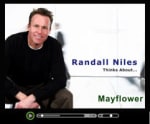Mayflower Compact
Mayflower Compact – What is it?
The Mayflower Compact is a written agreement composed by a consensus of the new Settlers arriving at New Plymouth in November of 1620. They had traveled across the ocean on the ship Mayflower which was anchored in what is now Provincetown Harbor near Cape Cod, Massachusetts. The Mayflower Compact was drawn up with fair and equal laws, for the general good of the settlement and with the will of the majority. The Mayflower’s passengers knew that the New World’s earlier settlers failed due to a lack of government. They hashed out the content and eventually composed the Compact for the sake of their own survival.
All 41 of the adult male members on the Mayflower signed the Compact. Being the first written laws for the new land, the Compact determined authority within the settlement and was the observed as such until 1691. This established that the colony (mostly persecuted Separatists), was to be free of English law. It was devised to set up a government from within themselves and was written by those to be governed.
Mayflower Compact – What did it say?
The original document is said to have been lost, but the writings of William Bradford’s journal Of Plymouth Plantation and in Edward Winslow’s Mourt’s Relation: A Journal of the Pilgrims at Plymouth are in agreement and accepted as accurate. The Mayflower Compact reads:
"In the name of God, Amen. We, whose names are underwritten, the Loyal Subjects of our dread Sovereign Lord, King James, by the Grace of God, of England, France and Ireland, King, Defender of the Faith, e&. Having undertaken for the Glory of God, and Advancement of the Christian Faith, and the Honour of our King and Country, a voyage to plant the first colony in the northern parts of Virginia; do by these presents, solemnly and mutually in the Presence of God and one of another, covenant and combine ourselves together into a civil Body Politick, for our better Ordering and Preservation, and Furtherance of the Ends aforesaid; And by Virtue hereof to enact, constitute, and frame, such just and equal Laws, Ordinances, Acts, Constitutions and Offices, from time to time, as shall be thought most meet and convenient for the General good of the Colony; unto which we promise all due submission and obedience. In Witness whereof we have hereunto subscribed our names at Cape Cod the eleventh of November, in the Reign of our Sovereign Lord, King James of England, France and Ireland, the eighteenth, and of Scotland the fifty-fourth. Anno Domini, 1620."
Mayflower Compact – Who signed it and why?
One of the first lists of the Mayflower Compact’s signers was provided by William Bradford’s nephew, Nathaniel Morton. The names are published in his 1669 New England’s Memorial. They are also posted by the Avalon Project of Yale University. Some of the more familiar names includes are those such as: John Carver, William Bradford, Edward Winslow, William Brewster, Isaac Allerton, Myles Standish, and John Alden.
When creating the Mayflower Compact, the signers believed that covenants were not only to be honored between God and man, but also between each other. They had always honored covenants as part of their righteous integrity and agreed to be bound by this same principle with the Compact. John Adams and many historians have referred to the Mayflower Compact as the foundation of the U.S. Constitution written more than 150 years later.
America was indeed begun by men who honored God and set their founding principles by the words of the Bible. They lived their lives with honesty, reliability, and fairness toward establishing this country “for the sake of its survival.” A great many of America’s Founding Fathers have been quoted in regard to living by Biblical values.
Edmund Burke (1729-1794), outstanding orator, author, and leader in Great Britain, defended the colonies in Parliament. "There is but one law for all, namely, that law which governs all law, the law of our Creator."
Patrick Henry (1736-1799), five-time Governor of Virginia, whose "Amongst other strange things said of me, I hear it is said by the deists that I am one of their number; and, indeed, that some good people think I am no Christian. This thought gives me much more pain than the appellation of Tory; because I think religion of infinitely higher importance than politics; and I find much cause to reproach myself that I have lived so long and have given no decided and public proofs of my being a Christian. But, indeed, my dear child, this is a character which I prize far above all thisworld has, or can boast.” (S. G. Arnold, The Life of Patrick Henry (Auburn: Miller, Orton & Mulligan, 1854), p. 250.)
Thomas Jefferson (1743-1826), third U.S. President, chosen to write the Declaration of Independence, said: "I have little doubt that the whole country will soon be rallied to the unity of our Creator, and, I hope, to the pure doctrines of Jesus also." He proclaimed that it was the God of the Bible who founded America in his 1805 inaugural address: "I shall need, too, the favor of that Being in whose hands we are, who led our forefathers, as Israel of old, from their native land and planted them in this country."



